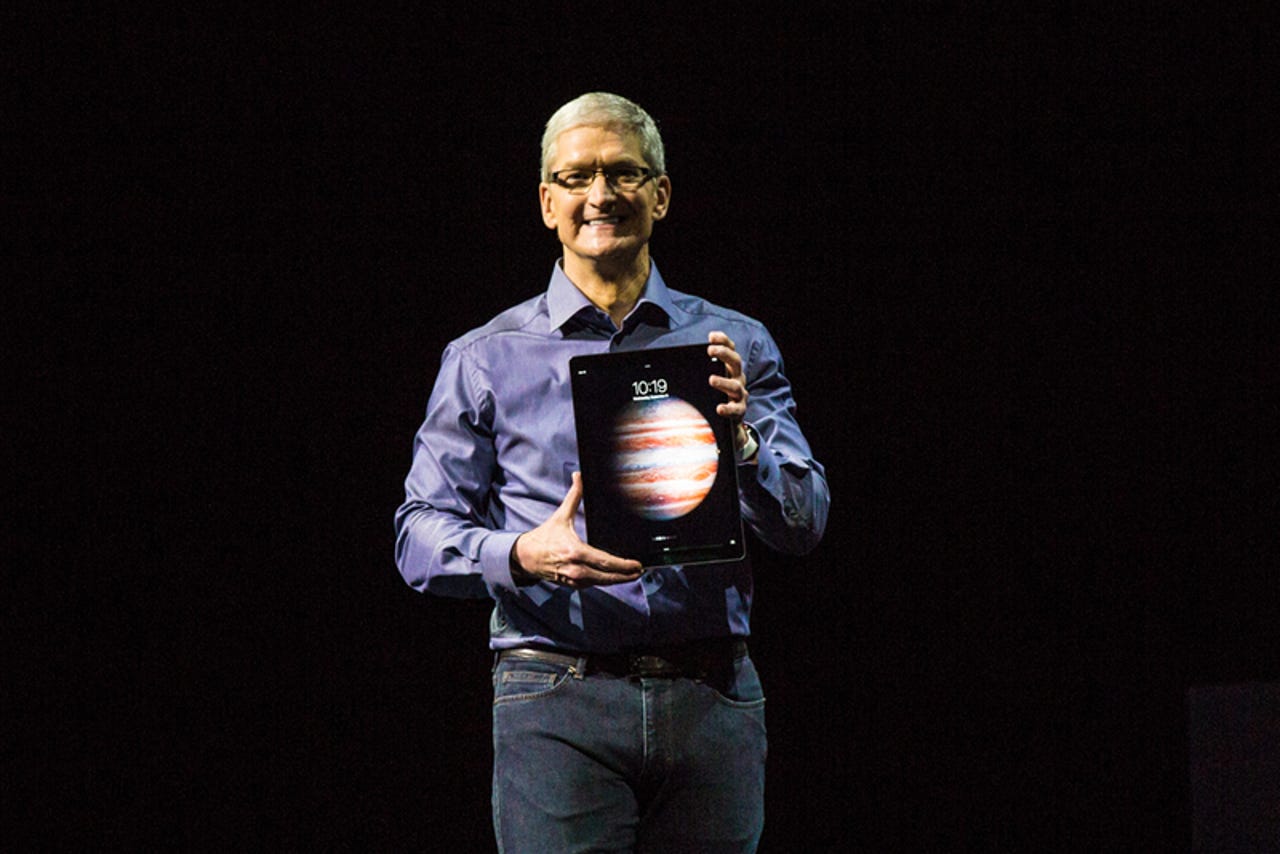Apple iPad Pro vs. 12-inch MacBook: A tough choice for me


After Wednesday's unveiling of the iPad Pro, my colleague Larry Dignan compared Apple's big slate to the company's 12-inch MacBook and Microsoft's Surface Pro.
The numbers don't lie, you can get a very capable Surface Pro 3 with keyboard for less than the iPad Pro and typing accessory. You'll likely spend even more for a Macbook. I know because I bought a MacBook to replace an aging MacBook Pro about two months ago. And I have a Surface Pro 3 with Type Cover.
Apple March 15
I don't, of course, have an iPad Pro. You can't get one until November.
And after watching the product's debut, I didn't even give the slate a thought. I have an iPad Air that's nearly two years old that I use for gaming -- Lara Croft GO, Star Wars Uprising and WSOP are my current faves --content consumption, web browsing, email and the like.
Here's the thing: Perhaps I could use the iPad Pro for work as well, completely removing a traditional desktop operating system from my life while also consolidating the number of devices that I carry.
Granted, my work requirements are relatively light compared to most. Frankly, even with a Core M processor, the MacBook is overkill for what I do.
I don't need to use Photoshop, a CAD program, or anything else that's compute-intensive. I generally use a browser all day long and do light photo edits such as crops and minor adjustments. That's why I previously purchased a Chromebook Pixel in fact: It does what I need to do and does it well.
The main reason I haven't gone "all in" on an iPad for work and pleasure is mainly the limiting screen size of 9.7-inches. It's just too small for me to comfortably research and write articles. The new multitasking in iOS 9 help with that -- I'm running the public beta on my iPad Air -- but the split-screen feature isn't supported. And frankly, the screen is a bit too small for that too.
The 12.9-inch iPad Pro resolves that issue though.
I'm positive I can work effectively on that size screen. I do it today on the 12-inch MacBook, the 12-inch Surface Pro 3 and the 12.85-inch Chromebook Pixel.
The big difference with the iPad Pro then is the fact that it runs a mobile operating system. And that could still present me with a challenge.
Some content management systems (CMS) don't run effectively in mobile browsers, for example. The CMS we use at ZDNet is better than most, however, and I'll be testing it further on my iPad Air with a Bluetooth keyboard. I'll still be stuck with the small screen but at least I'll know if the operating system and mobile Safari can cut it.
Apple iPhone-and-more event in pictures
I also do two podcasts a week and co-host the Tech News Today video show on Wednesdays. That's where a "full-fledged" computer comes in handy. A little research last night, however, shows that it's more than possible to record and edit a podcast using iOS apps. For Tech News Today, I simply need Skype, which works just fine on iOS.
There's another reason I'm considering the switch. And it would be a switch: Just as the Surface Pro 3 has replaced a smaller Windows tablet and other Windows laptops, the iPad Pro would rid me of carrying both the MacBook and an iPad.
Even though tablet sales are on a downward trend, I think Tim Cook was right about the computer industry in general when on Wednesday he said the iPad is "our vision of the future of personal computing."
That's because the performance of power-efficient ARM processors used in phones and tablets is have inarguably increased many times over in the past decade. Intel's x86 approach has taken the opposite tact: Performance was the focus first which only to later changed to power efficiency. We're getting closer to parity between the two chip architectures in many ways.
So using a mobile device these days doesn't have to mean a vast performance difference from a desktop or laptop.
Then there's the maturity of mobile apps that can take advantage of the strengthening platform. If you don't believe that, then you missed Microsoft demonstrating its updated Office suite for iOS.
Apps that were once only in the realm of desktop platforms are migrating over to mobile. And you know what: For many people, they're quickly becoming more than good enough.
I think that trend will continue with even more "pro" apps for mobile, especially now that with the iPad Pro there's hardware that can support them.
Again, I'm only sharing thoughts on my own buying process which is completely dependent on my computing needs. Yours are likely different or more demanding, in which case an iPad Pro may not cut it.
As I cover this industry though, I have to make bets and purchases on where I think things are headed so that I understand the trends and the reasons behind them. And I think we're headed towards a future where one day mobile apps will be more than good enough for most people.